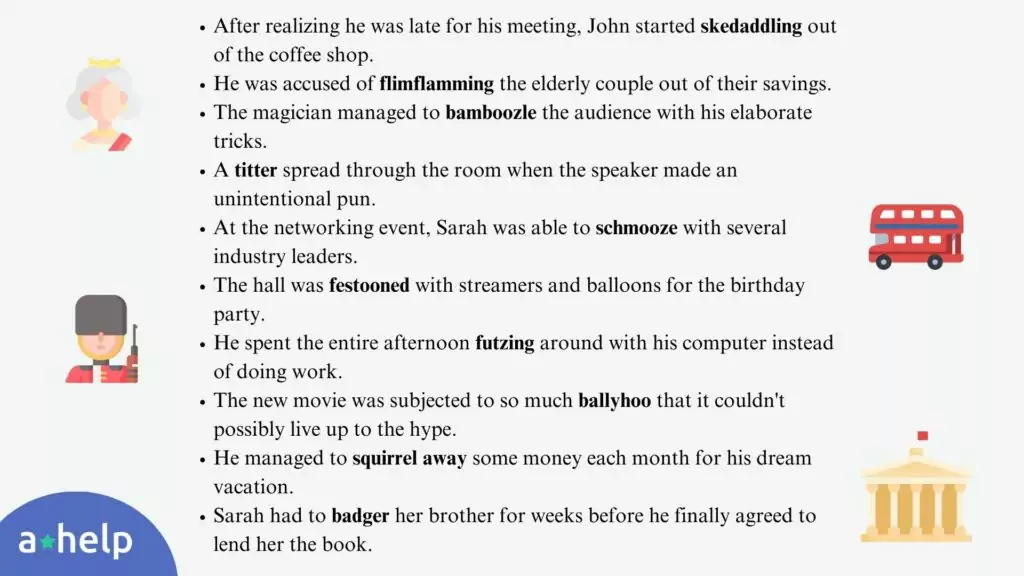When it comes to language, adding a touch of humor can make all the difference. Using funny verbs not only showcases your creativity but also adds an element of fun to your conversations and writing. In this article, we will explore a list of funny verbs that you can incorporate into your vocabulary. From skedaddling to bamboozling, these words are sure to bring a smile to your face and impress your friends. So, let’s dive in and discover the amusing world of funny verbs!

✅ AI Essay Writer ✅ AI Detector ✅ Plagchecker ✅ Paraphraser
✅ Summarizer ✅ Citation Generator
Skedaddling: Making a Swift Exit
Skedaddling, which means to leave immediately or run away, is a hilarious verb to incorporate into your conversations. Picture your kid skedaddling when they accidentally break your neighbor’s window. This word dates back to the 19th century when it was used as slang in the American Military. For example, “I skedaddled to the hospital when I received the news that my son was not doing fine.”
Flimflamming: Playful Deception
Flimflamming is a funny verb that can be used instead of “swindle” or “cheat.” It adds a playful twist to your vocabulary. Imagine someone flimflamming an old lady out of her retirement money. It’s important to note that flimflamming is a transitive verb, requiring an object to complete the action. Use it in active voice for maximum impact. For instance, “The man is flimflamming the old lady out of her retirement money.”
Bamboozle: Tricking with Style
When you pretend to be all good while harboring ulterior motives, you are bamboozling others. This funny verb adds a touch of intrigue and mischief to your conversations. However, it’s essential not to confuse bamboozle with advertising, as it has a different connotation. For example, “He bamboozled the lecturer into thinking he was sick.”
Titter: Nervous Laughter Unleashed
Tittering refers to laughing nervously, especially when it’s inappropriate. Imagine trying to stifle your laughter when your friend cracks a joke in the library or when your elder sister makes a cheeky remark about your mother’s outfit during a serious dinner. Tittering adds a sense of humor to awkward moments. For instance, “She tittered when the teacher gave out guidelines for the assignment.”
Schmooze: Casual Chats with Flair
Schmoozing involves engaging in casual and lively conversations. It’s a useful skill, especially if you work in professions like politics or hospitality, where interacting with people is key. You can schmooze to share your business card or simply for fun. The word originates from Yiddish, where “shmuesn” means to chat. For example, “He stopped at the reception to schmooze with the receptionists.”
Festooned: Decorating with Pizzazz
If you’re looking to add festive flair to your surroundings, try festooning. The term “festoon” comes from the Italian word “festone,” which means feast. Festooning involves adorning a space with decorations. While floral materials are commonly used, you can also use fabric or paper chains to create an eye-catching display. For instance, “He was festooning his room when his mother called.”
Futz: Wasting Time with Finesse
Futz is a slang term that means “to fool around” or waste time. It can also refer to idling. Imagine your friend arriving uninvited at your home to futz around. This funny verb captures the essence of aimlessly passing time in a playful manner. For example, “He futzed around before joining the class.”
Ballyhoo: Making Noise to Attract Attention
When a business puts in excessive effort to win customers, it’s referred to as ballyhooing. This verb is often associated with using a lot of noise or hype to grab people’s attention. It can be used to express skepticism when something is not as impressive as it claims to be. You can also add the “-ed” suffix. For instance, “The enterprise ballyhooed the event for the entire month while other activities continued.”
Squirrel Away: Secretive Stashing
Squirrel away is a phrasal verb that involves hiding something until the right time comes. The image of a squirrel hoarding food for the winter perfectly encapsulates this concept. For example, “I bought some Christmas presents in October and squirreled them away until December.”
Badger: Annoying Persistence
The word “badger” isn’t just a noun; it can also be used as a verb to describe annoying someone by repeatedly telling them what to do or asking the same question. Imagine a former employer badgering you to come back to work. This playful verb adds a touch of exasperation to everyday situations.

Conclusion
Incorporating funny verbs into your vocabulary, along with funny Mexican sayings in English, is a great way to add humor and creativity to your conversations and writing. From skedaddling to badgering, these words provide a playful twist that will impress your friends and showcase your linguistic prowess. Just as the charm of funny Mexican sayings enriches your language with cultural flair, funny verbs make your speech more vibrant and entertaining. So go ahead, embrace the amusing world of funny verbs and the wit of translated sayings, and watch as your language becomes more vibrant and entertaining!
FAQ
Follow us on Reddit for more insights and updates.





Comments (0)
Welcome to A*Help comments!
We’re all about debate and discussion at A*Help.
We value the diverse opinions of users, so you may find points of view that you don’t agree with. And that’s cool. However, there are certain things we’re not OK with: attempts to manipulate our data in any way, for example, or the posting of discriminative, offensive, hateful, or disparaging material.